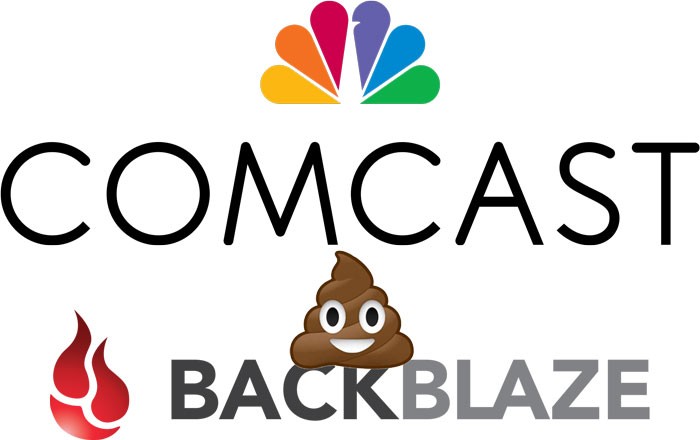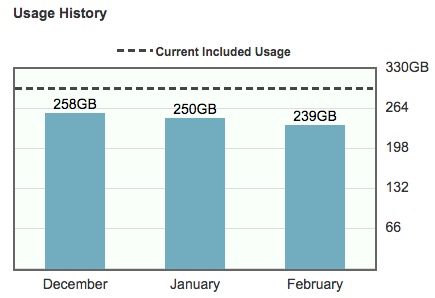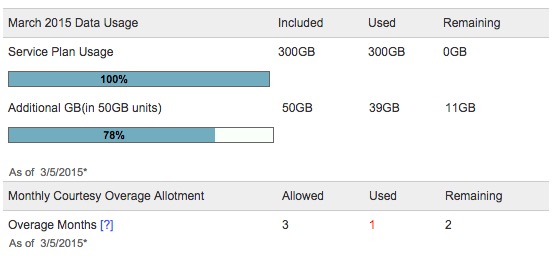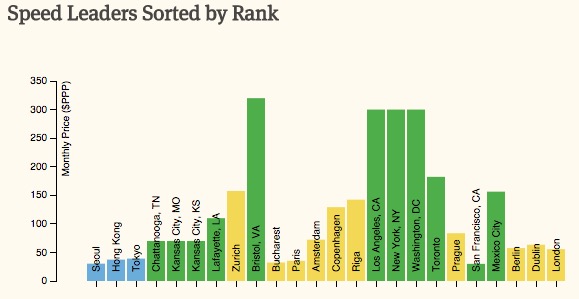
The idea of paying $50 per year for a off-site backup for all of your photos and other data on your computer is very nice. For many, the practicality of backing it all up is dependent on an ISP that operates a monopoly and subjects its customers to a stingy data cap.
Backblaze and Comcast: A Match Made in Hell
I have been trying for a year to get a computer backed up to Backblaze. It’s my home computer with my Lightroom library and video archives on it. I have roughly 3TBs of data that I need to back up.
Unfortunately, my family and I chew through our 300GB data cap from Comcast each month using Netflix, YouTube, Lynda.com, Xbox and just general Internet usage. We haven’t quite hit the 300GB cap because I monitor the usage in our Comcast account. However, we are over 200GB every month, and most months over 250GB of usage.

In those months where we are closing in on our data cap, I have to cut off Netflix use from everyone until the new month rolls around as a self-throttling mechanism. If we have room left in the last few days of the month, I turn on my Backblaze update software to try to get as much backed up as possible. That’s maybe a few dozen gigabytes in a good month.
I am accumulating photos and video footage at a faster rate than I am backing it up.
Limited Options
Unfortunately, Comcast is the only ISP that delivers a serviceable speed in this area. The only other ISP available is a DSL provider, which I have used before, but their speeds no longer qualify as “broadband” under the FCC’s recent redefinition of the minimum requirements. My previous experience brought me back to a hair-pulling state that nearly rivaled dial-up. Everything required substantial buffering before it would play and uploads went like molasses.
As online media consumption grows, the current state of cable Internet service from Comcast is untenable. Those considering cord-cutting may be faced with rude awakenings as the cable provider you are trying to flee still holds the keys to your cord-free online media plans. HD video sucks down hard on those caps, so you had better think twice before you upgrade to 4K Netflix.
The state of ISP data caps is already in shambles for photographers and video enthusiasts who want to protect their photos and videos by backing them up online. It simply doesn’t work with a modern family’s already heavy use of the Internet.
As it stands now, Comcast provides me with 300GB of data usage each month. If I exceed that limit, Comcast bills me in 50GB blocks for $10 each. There are 3 allowed overage months in my account, which I have never used until this month.

I left my Backblaze service running for a few days at the beginning of March just to see how Comcast handled the overage months. Sadly, its “Overage Months” are not really entire months where it forgives your overage but are 50GB allotments, of which I will probably use all three this month even though I have turned off Backblaze at this point and pay for an additional 50GB block or two. And that’s even with self-throttling of Netflix and gaming usage.
Better Internet Around the World
As I have looked more into this scourge, it is eye-opening to see other locations around the world that deliver affordable Internet without a data cap. In Seoul, South Korea, you can get 1000Mbps broadband over fiber with no data cap for $30 per month.
Even just down the road from me in Chattanooga, Tennessee, the non-profit municipal corporation EPB delivers 1000Mbps for $69.99 per month . . . also without a data cap.

Cities around the world have providers that deliver affordable, cap-free Internet service to customers. So why, again, is Comcast sticking it to its customers?
Because Comcast Can.
Data caps aren’t going away, which really sucks for innovative uses of technology like remote backup plans. Data caps are big money for Comcast and other ISPs. And it is just too easy for them to pass up those profits.
Data caps also serve double duty to discourage time spent online in favor of more traditional media like television. Given that the TV providers are often the ISPs as well, it is easy to see why Comcast and others don’t want to make it easy (or cheap) on cord-cutters.
[youtube https://www.youtube.com/watch?v=uyuIiG4c4Go&w=700]A Look to the Future Internet
While we wait for better solutions to arrive (and clearly, they are out there), we are stuck with a crippled Internet that prevents us from performing something as reasonable as backing up our photos and videos. That $50/year service from Backblaze would be awesome – if I could actually back up my data.
While I could just open the floodgates and pay for 50GB increments at $10 each, the resulting bill would be close to $600 on top of my normal cable and Internet bill. That is simply unreasonable when someone in Chattanooga (a little over an hour drive from Knoxville) can use the Internet in the exact same way for $69.99 with no fear of astronomical prices at the end of the month.
Depending on how the FCC enforces Title II (assuming the endeavor passes through without congressional interference), we can only hope that the FCC’s new rules will take some strain off of the way monopolies like Comcast gouge its customers. The only thing that is going to make Comcast and other providers change their practices is losing customers, which won’t happen as long as its customers have nowhere else to turn.
Until then, I will keep backing up my data . . . a few dozen gigabytes on the last couple days of each month.


Pretty sure you can mail them a hard drive….assuming you’re not generating TB of data a month.
Call and ask them?
-Jordan
http://www.theblackandwhitelife.com
Unfortunately, that’s not an option that Backblaze offers. I’ve asked.
I too live under a Comcast data cap, though I have 350GB/month. I really hate it, especially since there is nothing I can do about it.
At least where I am, though, if I go over my 350, regardless of how much, it’s still one month. For example, in January, I hit 90% of my limit halfway through the month. I said “screw it” and proceeded to download a lot of stuff I had been putting off (digital downloads of a web series I backed). Since I use a backup service, everything that was downloaded also got uploaded to my backup. Out of the 350GB/month I’m normally allowed, I used 750GB. I still have 2 months left where I can go over.
I will say that when I signed up for my backup service, I didn’t have nearly as much to upload and I also hadn’t cut the cord yet.
I bought my second pick for a house simply because #1 could only get Comcast. thats how much I hate them.
Comcast business Class has no data limits. Just need your Fed tax ID and your set.
They also have a nasty early cancelation fine. Someone I know signed up for that and needed to cancel due to moving. They were faced with a couple thousand dollar charge, though they were going to rent their house so they may have just included internet in the rental.
I’d recommend switching to CrashPlan Pro for Business. You can seed them your initial backup on a hard drive. Switching to a business class internet plan as someone else has commented is also the way to go.
I just mail a relative in another state a hard drive once in a while and keep one in my safe deposit box. Much cheaper.
It is also a problem that Backblaze’s code is very buggy. I also have several terabytes of data that I wanted to backup. In the spring of 2015 I tried using Backblaze to backup my data. What I found is due to bugs in their backup engine, they would repeatedly upload the SAME files to their data center even when those files were not changing. Their software somehow corrupted the data in transit. When I tried working with customer support on this issue I was told that there must be some mysterious problem with my computer. Yet I am able to successfully archive, encrypt and upload that same data (via cygwin tools) to Google Drive with no problems. Basically Backblaze is a mediocre company – they make fancy promises, have nice and friendly social media engagement, but they do not have the software / tech support talent to do their job reliably.
This Backblaze behavior of repeatedly trying to backup the same files unsuccessfully results in a lot of bandwidth being wasted. It also means that your data is never fully backed up – i.e. you are unprotected.